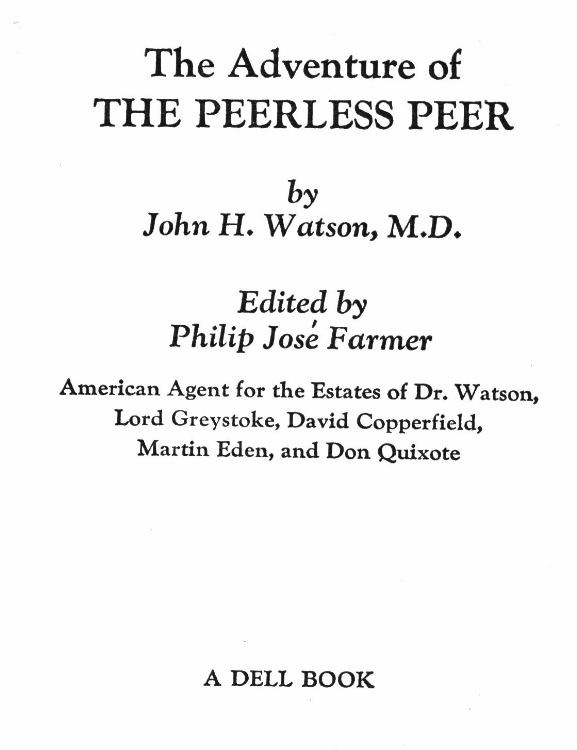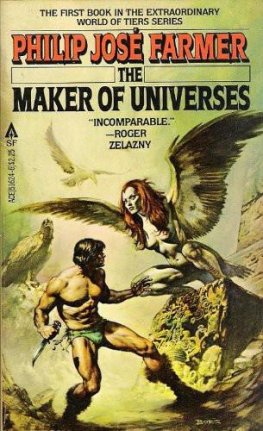Philip Jose Farmer - The Adventures of the Peerless Peer
Here you can read online Philip Jose Farmer - The Adventures of the Peerless Peer full text of the book (entire story) in english for free. Download pdf and epub, get meaning, cover and reviews about this ebook. year: 1976, publisher: Dell Books, genre: Detective and thriller. Description of the work, (preface) as well as reviews are available. Best literature library LitArk.com created for fans of good reading and offers a wide selection of genres:
Romance novel
Science fiction
Adventure
Detective
Science
History
Home and family
Prose
Art
Politics
Computer
Non-fiction
Religion
Business
Children
Humor
Choose a favorite category and find really read worthwhile books. Enjoy immersion in the world of imagination, feel the emotions of the characters or learn something new for yourself, make an fascinating discovery.
- Book:The Adventures of the Peerless Peer
- Author:
- Publisher:Dell Books
- Genre:
- Year:1976
- Rating:4 / 5
- Favourites:Add to favourites
- Your mark:
- 80
- 1
- 2
- 3
- 4
- 5
The Adventures of the Peerless Peer: summary, description and annotation
We offer to read an annotation, description, summary or preface (depends on what the author of the book "The Adventures of the Peerless Peer" wrote himself). If you haven't found the necessary information about the book — write in the comments, we will try to find it.
Philip Jose Farmer: author's other books
Who wrote The Adventures of the Peerless Peer? Find out the surname, the name of the author of the book and a list of all author's works by series.
The Adventures of the Peerless Peer — read online for free the complete book (whole text) full work
Below is the text of the book, divided by pages. System saving the place of the last page read, allows you to conveniently read the book "The Adventures of the Peerless Peer" online for free, without having to search again every time where you left off. Put a bookmark, and you can go to the page where you finished reading at any time.
Font size:
Interval:
Bookmark:


SERENDIPITOUS ENCOUNTER ...
... The cobra struck, and Holmes and I both jumped, yelling at the same time.
Something hissed through the air. The cobra was knocked aside by the impact of the missile, and it writhed dying on the ground. An arrow transfixed it just back of the head.
"Steady, Watson!" Holmes said. "We are saved, but the savage who shot that may have preserved us only so he'll have fresher meat for his pot!"
Suddenly we leaped into the air again, uttering a frightened scream. Seemingly out of the air, a man had appeared before us ... Holmes recovered first.
He said, "Lord Greystoke, I presume?"
Published by
DELL PUBLISHING CO., INC.
1 Dag Hammarskjold Plaza
New York, N.Y. 10017 Copyright 1974 by Philip Jose Farmer.
All rights reserved.
Dell TM 681510, Dell Publishing Co" Inc.
Reprinted by arrangement with the author.
Printed in the United States of America
First Dell Printing-September 1976
Dedicated to Samuel Rosenberg,
who has embroidered for the world
the greatest Doylie ever.
All the characters in this book are real;
any resemblance to fictional characters
is purely coincidental.
FOREWORD
As everybody knows, Dr. Watson stored in a battered tin dispatch-box his manuscripts concerning the unpublished cases of Sherlock Holmes. This box was placed in the vaults of the bank of Cox and Co. at Charing Cross. Whatever hopes the world had that these papers would some day become public were destroyed when the bank was blasted into fragments during the bombings of World War II. It is said that Winston Churchill himself directed that the ruins be searched for the box but that no trace of it was found.
I am happy to report that this lack of success is no cause for regret. At a time and for reasons unknown, the box had been transferred to a little villa on the south slope of the Sussex downs near the village of Fulworth. It was kept in a trunk in the attic of the villa. This, as everybody should know, was the residence of Holmes after he had retired. It is not known what eventually happened to the Greatest Detective. There is no record of his death. Even if there were, it would be disbelieved by the many who still think of him as a living person. This almost religious belief thrives though he would, if still alive, be one hundred and twenty years old at the date of writing this foreword.
Whatever happened to Holmes, his villa was sold in the late 1950's to the seventeenth Duke of Denver. The box, with some other objects, was removed to the ducal estate in Norfolk. His Grace had intended to wait until after his death before the papers would be allowed to be published. However, His Grace, though eighty-four years old now, feels that he may live to be a hundred. The world has waited far too long, and it is certainly ready for anything, no matter how shocking, that may be in Watson's narratives. The duke has given his consent to the publication of all but a few papers, and even these may see print if the descendants of certain people mentioned in them give their permission. Gratitude is due His Grace for this generous decision.
On hearing the good news, your editor communicated with the British agents handling the Watson papers and was fortunate enough to acquire the American Agency for them. The adventure at hand is the first to be released; others will follow from time to time.
Watson's holograph is obviously a first draft.
A number of passages recording words actually uttered by the participants during this adventure are either crossed out or replaced with asterisks. The "peerless peer" of this tale is called "Greystoke," but on one occasion old habit broke through and Watson inadvertently wrote "Holdernesse." Watson left no note explaining why he had substituted one pseudo-title for another. He used "Holdernessee" in "The Adventure of the Priory School" to conceal the identity of Holmes' noble client. Holmes himself, in his reference to the nobleman in his "The Adventure of the Blanched Soldier," used the pseudotitle of "Greymin ster."
It is your editor's guess that Watson decided on "Greystoke" in this narrative because the pseudotitle had been made world-famous by the novels based on the African exploits of the nephew of the man Watson had called "Holdernesse."
The adventure at hand is singular for many reasons. It reveals that Holmes was not allowed to stay in retirement after the events of "His Last Bow." We are made aware that Holmes made a second visit to Africa, going far beyond Khartoum (though not willingly), and so saved Great Britain from the greatest danger which has ever threatened it. We are given some illumination on the careers of the two greatest American aviators and spies in the early years of World War I. We learn that Watson was married for the fourth time, and the destruction of a civilization rivalling ancient Egypt is recorded for the first time. Holmes' contribution to apiology and how he used it to save himself and others is related herein. This narrative also describes how Holmes' genius at deduction enabled him to clear up a certain discrepancy that has puzzled the more discerning readers of the works of Greystoke's American biographer.
Some aspects of this discrepancy are revealed by Lord Greystoke himself in "Extracts from the Memoirs of Lord Greystoke," Mother Was a Lovely Beast, Philip Jose Farmer, editor, Chilton, October, 1974. However. this revelation is only a minor part of Watson's chronicle, one among many mysteries solved, and this account presents the mystery from a somewhat different viewpoint.
Your editor decided for these reasons to leave this explanation in this work. Besides, your editor would not dream of tampering with any part of the Sacred Writings.
PhilipJoseFarmer
It is with a light heart that I take up my pen to write these the last words in which I shall ever record the singular genius which distinguished my friend Sherlock Holmes. I realise that I once wrote something to that effect, though at that time my heart was as heavy as it could possibly be. This time I am certain that Holmes has retired for the last time. At least he has sworn that he will no more go a-detectiving. The case of the peerless peer has made him financially secure, and he foresees no more grave perils menacing our country now that out great enemy has been laid low. Moreover. he has sworn that never again will he set foot on any soil but that of his native land. Nor will he ever again get near an aircraft. The mere sight or sound of one freezes his blood.
The peculiar adventure which occupies these pages began on the second day of February, 1916. At this time I was, despite my age, serving on the staff of a military hospital in London. Zeppelins had made bombing raids over England for two nights previously mainly in the Midlands. Though these were comparatively ineffective, seventy people had been killed, one hundred and thirteen injured, and a monetary damage of fifty-three thousand eight hundred and thirty-two pounds had been inflicted. These raids were the latest in a series starting the nineteenth of January. There was no panic, of course, but even stout British hearts were experiencing some uneasiness. There were rumours, no doubt originated by German agents, that the Kaiser intended to send across the channel a fleet of a thousand airships. I was discussing this rumour with my young friend, Dr. Fell, over a brandy in my quarters when a knock sounded on the door. I opened it to admit a messenger. He handed me a telegram which I wasted no time in reading.
Font size:
Interval:
Bookmark:
Similar books «The Adventures of the Peerless Peer»
Look at similar books to The Adventures of the Peerless Peer. We have selected literature similar in name and meaning in the hope of providing readers with more options to find new, interesting, not yet read works.
Discussion, reviews of the book The Adventures of the Peerless Peer and just readers' own opinions. Leave your comments, write what you think about the work, its meaning or the main characters. Specify what exactly you liked and what you didn't like, and why you think so.










